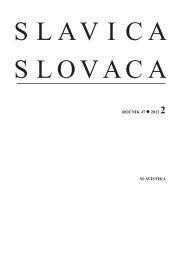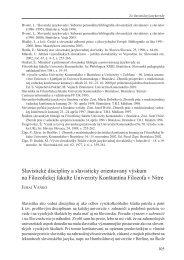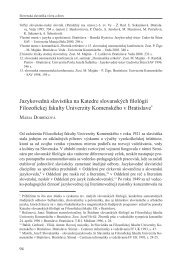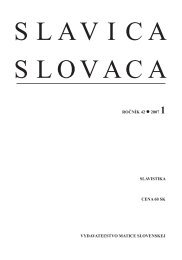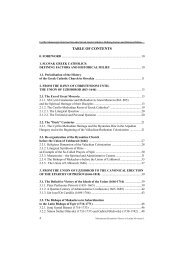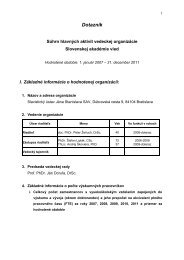ÄÃslo 2 - Slavistický ústav Jána Stanislava SAV
ÄÃslo 2 - Slavistický ústav Jána Stanislava SAV
ÄÃslo 2 - Slavistický ústav Jána Stanislava SAV
Create successful ePaper yourself
Turn your PDF publications into a flip-book with our unique Google optimized e-Paper software.
te¾a svojich kázní sa prejavilo aj v ich grafickej rovine. Pravopis jeho kázní je zložkový i diakritický:<br />
pri hláskach è a ž je naznaèený mäkèeò, hlásku š zapisoval ako digrafému ss, hlásku j ako g,<br />
a dôsledne sa vyhýbal používaniu èeských hlások ø, ì i grafémy ù. Zo slovotvorných prostriedkov<br />
vyššieho štýlu predspisovnej slovenèiny používal jazykové podoby nesmrtedlny, muèedlnik.<br />
V dobe, keï D. Mokoš písal svoje kázne a prekladal latinské citáty v nich, bola u nás latinèina<br />
ešte stále hierarchicky najvyššie hodnoteným jazykom. Jej používanie bolo znakom vzdelanosti,<br />
a preto aj vzdelanci, ktorí sa chceli vyjadri vo vysokom uèenom a publicistickom štýle, sa pokúšali<br />
napodobòova súvetia tvorené pod¾a vzoru klasickej latinèiny. Texty misionárskych kázní však boli<br />
urèené predovšetkým prostému ¾udu, vzdelaný kazate¾ musel pri tvorbe kázne bra do úvahy jej<br />
potenciálnych percipientov. Preto sa aj D. Mokoš v kázòach snažil používaním ¾udových hovorových<br />
výrazov, prísloví a porekadiel èo najviac priblíži svojim poslucháèom. O prekladoch latinských<br />
citátov z patristickej literatúry v jeho kázòach možno konštatova , že zodpovedajú latinskej<br />
predlohe. Stavba vety je v závislosti od latinskej predlohy niekedy jednoduchá a schematická, inokedy<br />
má živý reènícky pátos. Na sprostredkovanie myšlienok cirkevných otcov autor používal pestrú<br />
škálu výrazových prostriedkov, pri tvorbe jednotlivých syntagiem podliehal vplyvu klasickej<br />
latinskej cicerónskej syntaxe. Rozsiahle a zložité súvetia tvorené pod¾a vzoru klasickej latinèiny<br />
však v prekladoch D. Mokoša nenájdeme aj preto, lebo texty, ktoré prekladal, už tento vzor nerešpektovali<br />
v plnej miere.<br />
Translation of Latin Patristic Quotations in the Sermons<br />
of Franciscan Monk Dominik Mokosh<br />
Angela Škovierová<br />
The study analyses two volumes of sermons by Dominik Mokosh, a member of the Franciscan order and a missionary<br />
preacher, active in various regions of the then Slovakia in the middle of 18th century. Mokosh wrote 5 volumes of sermons in pre-<br />
Bernolak´s Slovak. Even though he attempted to make the analyzed sermons familiar to his audience through the use of colloquialisms,<br />
proverbs, comparisons and folk sayings they were also full of Latin phrases: maxims, quotations from the Bible and<br />
patristic literature. From the work of the Ecclesiastical fathers he quoted especially: Augustinus Aurelius, Beda Venerabilis, Origenes,<br />
Joannes Chrisostomus, Hilarius, Ambrosius, Cyprianus, Eusebius, Basilius Magnus, Georgius Magnus, Leo Magnus.<br />
Hieronymus, Tadeas, Hypolitus, Bernardus and Anzelmus Canterburiensis.<br />
Our analysis of quotations from patristic literature shows that D. Mokosh used the moral authority of the Ecclesiastical<br />
fathers when he wanted to support the message of the sermon.<br />
The Latin of these quotes is different from the classical Latin of Cicero’s age. Not only many of the expressions had acquired<br />
a new meaning, the sentence construction itself developed towards simplicity. Mokosh´s use of them could be described as an act<br />
of specific inter-lingual translation. As he was influenced by the example of classical Latin of Cicero’s age, with its branching<br />
sentences, wealth of adjectives and verb positioned at the end of the sentence, he was not always able to follow the simplified<br />
sentence structure of the 3rd-4th century Latin and his translations, although they’d preserved the original meaning, were often<br />
enriched by new elements (e.g. adjectives), which were absent in the original text of the quotes.<br />
162



